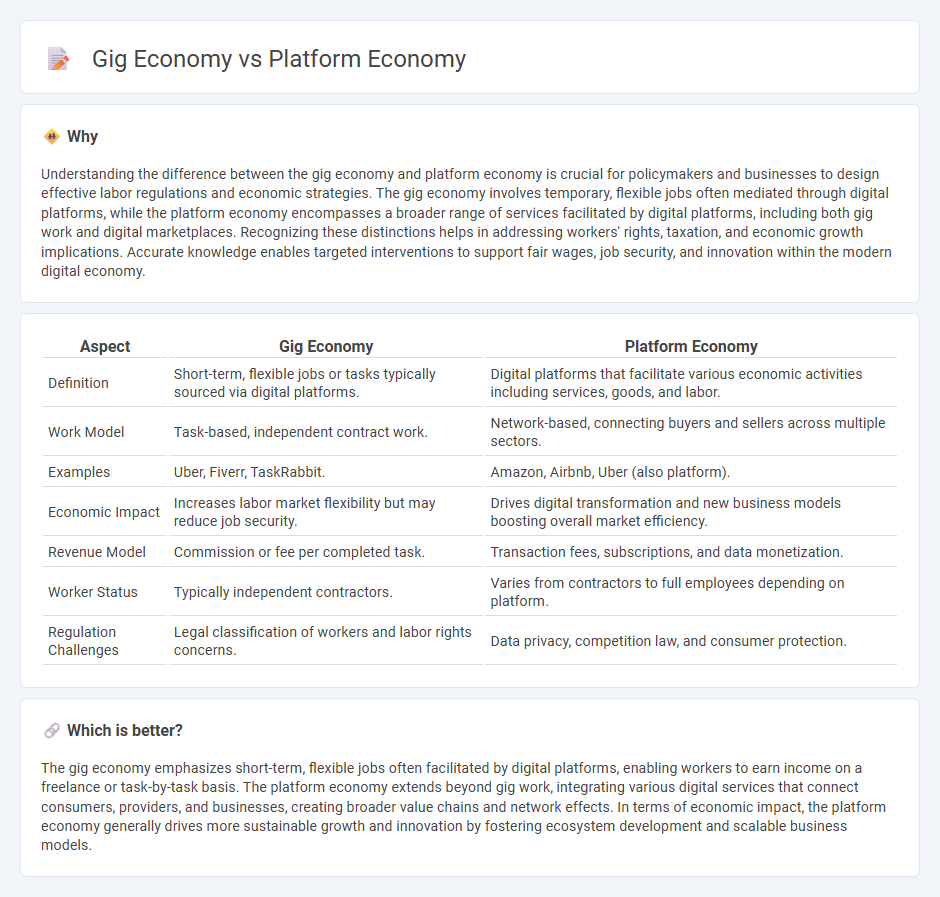
The Gig economy refers to a labor market characterized by short-term, freelance, or temporary jobs, often facilitated by digital platforms that connect workers with clients. In contrast, the Platform economy encompasses a broader ecosystem where digital platforms enable various transactions, services, and interactions beyond just labor, including e-commerce and content creation. Explore the distinctions between these economic models to understand their impact on employment and digital innovation.
Why it is important
Understanding the difference between the gig economy and platform economy is crucial for policymakers and businesses to design effective labor regulations and economic strategies. The gig economy involves temporary, flexible jobs often mediated through digital platforms, while the platform economy encompasses a broader range of services facilitated by digital platforms, including both gig work and digital marketplaces. Recognizing these distinctions helps in addressing workers' rights, taxation, and economic growth implications. Accurate knowledge enables targeted interventions to support fair wages, job security, and innovation within the modern digital economy.
Comparison Table
| Aspect | Gig Economy | Platform Economy |
|---|---|---|
| Definition | Short-term, flexible jobs or tasks typically sourced via digital platforms. | Digital platforms that facilitate various economic activities including services, goods, and labor. |
| Work Model | Task-based, independent contract work. | Network-based, connecting buyers and sellers across multiple sectors. |
| Examples | Uber, Fiverr, TaskRabbit. | Amazon, Airbnb, Uber (also platform). |
| Economic Impact | Increases labor market flexibility but may reduce job security. | Drives digital transformation and new business models boosting overall market efficiency. |
| Revenue Model | Commission or fee per completed task. | Transaction fees, subscriptions, and data monetization. |
| Worker Status | Typically independent contractors. | Varies from contractors to full employees depending on platform. |
| Regulation Challenges | Legal classification of workers and labor rights concerns. | Data privacy, competition law, and consumer protection. |
Which is better?
The gig economy emphasizes short-term, flexible jobs often facilitated by digital platforms, enabling workers to earn income on a freelance or task-by-task basis. The platform economy extends beyond gig work, integrating various digital services that connect consumers, providers, and businesses, creating broader value chains and network effects. In terms of economic impact, the platform economy generally drives more sustainable growth and innovation by fostering ecosystem development and scalable business models.
Connection
The gig economy and platform economy are interconnected through digital platforms that facilitate flexible, on-demand work by linking independent contractors with clients or consumers. These platforms, such as Uber, Airbnb, and TaskRabbit, enable efficient resource allocation by matching supply and demand in real-time, driving economic activity and innovation. The rise of these economies reshapes labor markets, influencing income distribution, job security, and regulatory frameworks globally.
Key Terms
Intermediation
The platform economy is characterized by digital intermediaries connecting users and providers across various sectors, facilitating transactions via scalable software infrastructures. The gig economy, a subset of the platform economy, specifically involves short-term, flexible jobs mediated through such digital platforms, emphasizing labor intermediation in services like ride-sharing and freelance work. Explore the distinctions and impacts of these economic models to understand modern intermediation dynamics.
Flexibility
The platform economy offers digital infrastructures enabling businesses to connect with consumers efficiently, emphasizing scalable flexibility in services across various industries. Gig economy specifically highlights independent, short-term task-based work, providing workers with the freedom to choose projects and schedules, fostering personal time management. Explore how these economic models reshape labor markets and innovation by learning more about their distinct impacts on workforce flexibility.
Revenue Model
The platform economy primarily generates revenue through subscription fees, transaction commissions, and advertising, leveraging digital ecosystems that connect users and service providers at scale. In contrast, the gig economy's revenue model centers on facilitating short-term, freelance work engagements, typically taking a percentage cut from each completed task or project via apps like Uber or TaskRabbit. Explore how these distinct revenue strategies shape the future of work and digital marketplaces.
Source and External Links
Platform economy - Wikipedia - The platform economy involves economic and social activities facilitated by digital platforms like Amazon, Airbnb, Uber, and Google, acting as intermediaries between users and creating new business models driven by network effects and rapid scale, but also raising challenges such as precarious work and market concentration.
Platform economy | EBSCO Research Starters - The platform economy refers to economic activities on digital marketplaces connecting suppliers and consumers, driven by internet and smartphone adoption, encompassing transaction, innovation, and investment platforms that transform business models and consumer behavior.
What is platform economy? | Definition from TechTarget - Platform economy describes commerce moving toward digital platform models, including transaction platforms (e.g., Amazon), innovation platforms (e.g., Microsoft), and integration platforms (e.g., Apple App Store), changing how products and services are exchanged and affecting workforce roles.
 dowidth.com
dowidth.com